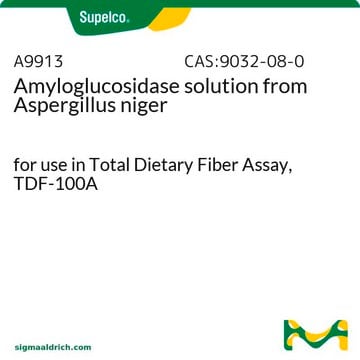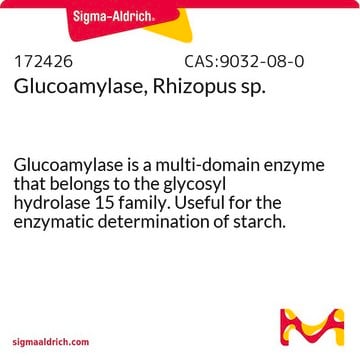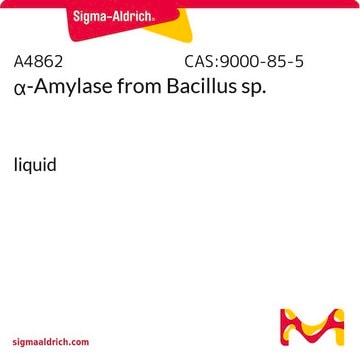The optimal temperature is 70 - 75 °C
A7095
Amyloglucosidase from Aspergillus niger
≥260 U/mL, aqueous solution
Synonym(s):
AMG 300L™, 1,4-α-D-Glucan glucohydrolase, Exo-1,4-α-glucosidase, Glucoamylase
About This Item
Recommended Products
biological source
Aspergillus niger
Quality Level
form
aqueous solution
specific activity
≥260 U/mL
density
~1.2 g/mL at 25 °C
storage temp.
2-8°C
Looking for similar products? Visit Product Comparison Guide
General description
Application
Biochem/physiol Actions
Other Notes
Legal Information
Signal Word
Danger
Hazard Statements
Precautionary Statements
Hazard Classifications
Resp. Sens. 1
Storage Class Code
10 - Combustible liquids
WGK
WGK 3
Choose from one of the most recent versions:
Certificates of Analysis (COA)
Don't see the Right Version?
If you require a particular version, you can look up a specific certificate by the Lot or Batch number.
Already Own This Product?
Find documentation for the products that you have recently purchased in the Document Library.
Customers Also Viewed
-
What is the optimum temperature of this enzyme?
1 answer-
Helpful?
-
-
Can I dilute the amyloglucosidase enzyme (A7095) in distilled/deionized water or should I use any specific buffer for dilution?
1 answer-
Unfortunately, the formulation of this solution is considered proprietary. There is no information regarding further dilutions, however the optimum pH is 4.5. Any aqueous diluent should like to stay in this approximate range. See the table below to review the pH on enzyme activity.
Helpful?
-
-
Could you please provide the source of the A7095 and the molecular weight of the enzyme? and is this a pure enzyme?
1 answer-
The source of this product can be found on the lot specific Certificate of Origin. This product is from species ASPERGILLUS NIGER. Please access a Certificate of Origin in the DOCUMENTATION section under 'Certificate of Origin':
https://www.sigmaaldrich.com/product/sigma/a7095#product-documentationAmyloglucosidase from A. niger exists as two isoforms with molecular weights of 69,810 kDa and 89,130 kDa, as determined by SDS-PAGE. See: Starch, 34, 346 (1982). The units/mL is determined per batch as reported in Certificate of Analysis. The purity is not part of product specification and is not determined.
Helpful?
-
Active Filters
Our team of scientists has experience in all areas of research including Life Science, Material Science, Chemical Synthesis, Chromatography, Analytical and many others.
Contact Technical Service











